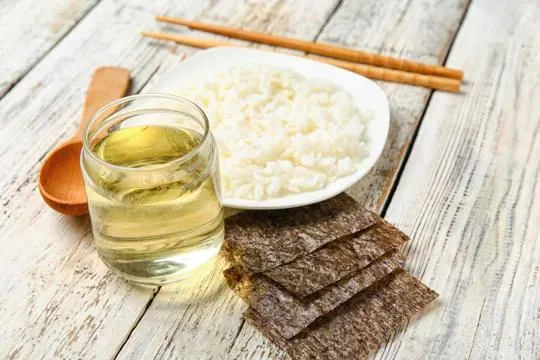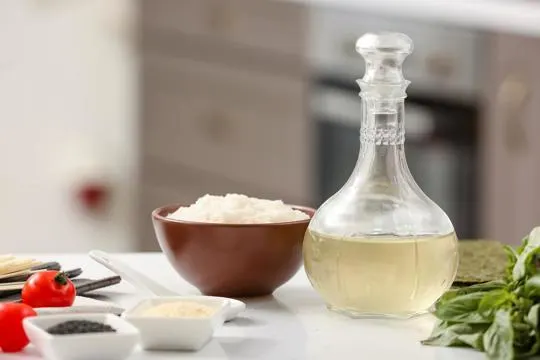Summary of key points
The terms aji mirin and rice vinegar are often used interchangeably in cooking, but they are actually two distinct ingredients with different purposes. Both originate from Japan and have a sweet taste, but that’s where their similarities end.
Aji mirin is a type of sweet rice wine that is commonly used as a marinade or glaze for meats and vegetables. It adds depth of flavor and helps to tenderize proteins. On the other hand, rice vinegar is made from fermented rice and is more acidic in taste. It is often used as a condiment or in marinades for its tangy flavor.
When it comes to using these two ingredients in recipes, it’s important to know which one will yield the desired result. Aji mirin may be substituted with a combination of sherry and sugar, while rice vinegar can be replaced with apple cider vinegar or white wine vinegar.
Aji Mirin and rice vinegar sit on our kitchen shelves, often mistaken for twins. Yet, they couldn’t be more different.
Aji Mirin boasts a sweet, syrupy vibe, perfect for glazes. Rice vinegar, zesty and mild, nails salad dressings. We’ve all been there, mixing them up, only to find our dishes taking unexpected turns.
Our misadventures in cooking have taught us this lesson. It’s crucial to know your bottles. Their unique flavors can make or break a meal.
What is Aji Mirin?

Aji Mirin – an essential in Japanese cuisine. It’s a cooking wine made from fermented rice.
Subtle sweetness and flavor enhancement make it a great addition to dishes.
Its low alcohol content means it won’t overpower the taste.
It also gives a glossy finish when used as a marinade or glaze.
Unlike regular mirin, Aji Mirin is healthier, with less sugar and salt.
It’s a staple in many Japanese households and restaurants.
For a depth and complexity in your dishes, try Aji Mirin.
What is Rice Vinegar?

Rice vinegar is made from fermented rice and has a mild, sweetish taste.
It’s often used in Asian dishes as flavoring, for dressings, and pickling.
It has different levels of sweetness. White rice vinegar is milder and used in sushi rice or dips.
Black rice vinegar has a strong taste and is great for braising meats or adding flavor to stir-fries.
Rice vinegar also has health benefits.
Low in calories; it contains essential nutrients like amino acids, antioxidants, and vitamins B1 and B2.
Studies suggest it may help digestion, weight management, and blood sugar control.
In conclusion, rice vinegar adds unique flavor.
Its various types offer different tastes and culinary possibilities.
Whether it’s for dressings or marinades, this tangy elixir will bring out the best in your cooking.
Differences Between Aji Mirin and Rice Vinegar

Aji Mirin and Rice Vinegar may look similar, but they have their own distinct characteristics.
Ingredients and Production
Ingredients and production are important to understand the qualities of Aji Mirin and rice vinegar.
Aji Mirin is made from fermented glutinous rice, koji, and sugar. It has a sweet flavor.
Rice vinegar is made from fermenting rice wine which gives it a tangy, sour taste.
Aji Mirin is used as a seasoning in Japanese cuisine.
Rice vinegar is used as a marinade or dressing to add acidity.
Aji Mirin has alcohol content which helps tenderize meats. Rice vinegar does not have this.
Flavor Profile and Taste
Aji Mirin and rice vinegar: two flavors with distinct characteristics.
Aji Mirin, a sweet Japanese cooking sake, has a rich and syrupy taste with a hint of sweetness and umami.
Rice vinegar, on the other hand, is tangy and acidic.
Both ingredients make dishes tastier, but in different ways.
Aji Mirin adds sweetness and richness, while rice vinegar brings brightness and acidity.
Together, they create a balanced flavor for any culinary creation.
Usage in Cooking
Cooking with Aji Mirin or Rice Vinegar can enhance flavors.
Aji Mirin is a sweet Japanese rice wine that adds a hint of sweetness to marinades, sauces, and glazes.
Its umami taste works well with savory ingredients like soy sauce and ginger.
Rice Vinegar has a tangy flavor profile from fermenting rice.
It is often used in salads, pickles, and sushi rice.
Its acidity brightens up dishes and cuts through fatty flavors.
Aji Mirin and Rice Vinegar can be substituted for each other, but they have distinct characteristics.
Aji Mirin brings complexity to dishes like Teriyaki chicken or glazing for roasted vegetables.
Rice Vinegar’s mild acidity uplifts delicate flavors like cucumber salads or seafood ceviches.
The difference in texture also affects their uses.
Aji Mirin’s syrup-like consistency coats evenly and creates a glossy finish.
Rice Vinegar’s thinner consistency blends into dressings or marinades without overpowering.
Similarities Between Aji Mirin and Rice Vinegar

Aji Mirin and Rice Vinegar have some things in common.
They are used in Asian cooking and can add unique flavor to meals.
Both have a bit of sweetness and can be used as marinades or in sauces.
However, Aji Mirin is a sweet rice wine, and Rice Vinegar is made from fermented rice.
This difference means each one has its own flavor profile.
Nevertheless, both can improve the taste of your favorite dishes and add depth.
Culinary Uses and Recipes for Aji Mirin and Rice Vinegar
Aji Mirin and rice vinegar are two essential ingredients in Japanese cooking.
Aji Mirin, a sweet rice wine, adds sweetness and depth to dishes like teriyaki sauce, glazes, and marinades.
Rice vinegar, on the other hand, adds a tangy and refreshing flavor to dressings, pickling solutions, sushi rice, and stir-fries.
These two ingredients can be used interchangeably in some cases.
For example, Aji Mirin’s sweetness can be replicated with rice vinegar and sugar/honey.
Plus, more rice vinegar can be added to mirin recipes to acquire the desired level of acidity.
However, it’s essential to note that Aji Mirin and rice vinegar have distinct taste profiles.
Aji Mirin’s sweetness makes it perfect for desserts like mochi and fruit sauces.
Rice vinegar’s mild acidity makes it an ideal topping for steamed vegetables or as a dipping sauce component.
Understanding the differences between Aji Mirin and rice vinegar can help elevate cooking skills and bring traditional Japanese flavors to your table.
Conclusion
In summary, there is a lot to consider when deciding between aji mirin and rice vinegar.
While both condiments provide similar benefits for cooking, each has its own unique characteristics and flavors.
It’s important to note the differences between these two products in order to know which one will work best for any particular dish you are preparing.
Keep in mind that you should also take into consideration individual taste preferences when selecting either of these condiments.
Ultimately, it all comes down to your personal preference and how you choose to enhance the flavor of your dishes.
Whether you prefer aji mirin or rice vinegar, exploring the different characteristics of these two condiments can help you achieve maximum deliciousness when preparing meals.

Leave a comment